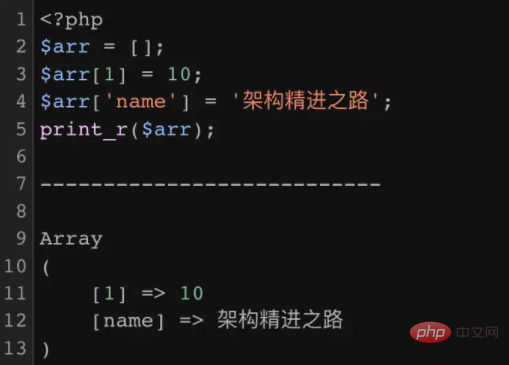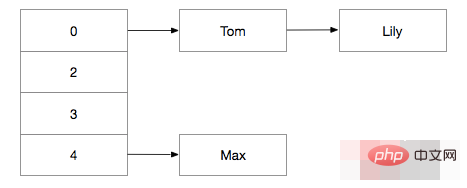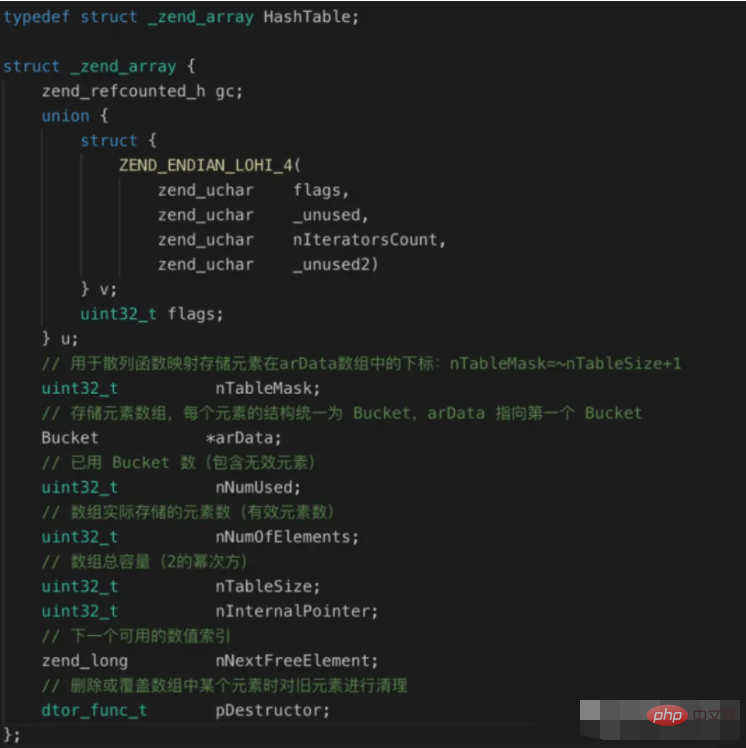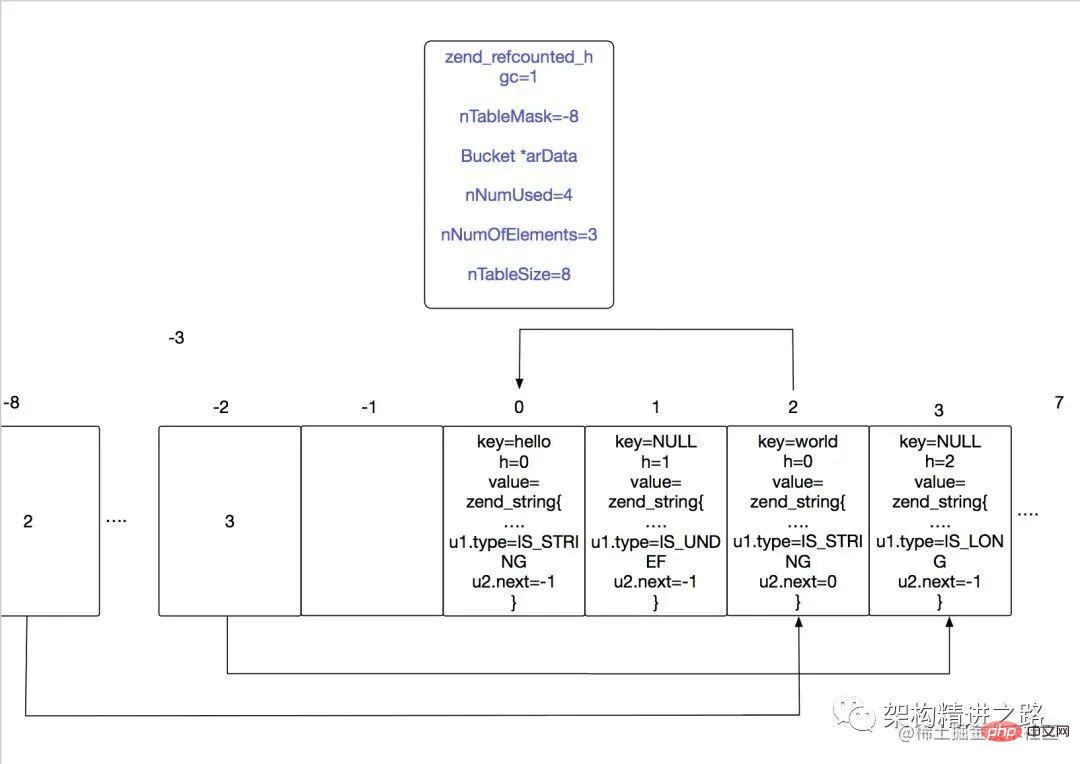 Backend Development
Backend Development
 PHP Tutorial
PHP Tutorial
 An in-depth analysis of how PHP arrays flexibly support multiple data types
An in-depth analysis of how PHP arrays flexibly support multiple data types
An in-depth analysis of how PHP arrays flexibly support multiple data types
This article brings you relevant knowledge about PHP. It mainly introduces to you how arrays can flexibly support multiple data types. Friends who are interested can take a look below. I hope it will be useful to you. help.

In PHP, the application processing of array data structures is very frequently used. Compared with strongly typed languages such as Java and C, PHP's arrays can simply It is said to be very easy to use and can store various types of data (such as numbers, strings and even objects, etc.), which brings great convenience to development.
Based on the powerful features of PHP arrays, we can easily implement more complex data structures, such as stacks, queues, lists, sets, dictionaries, etc.

Are you eager to find out: How does PHP implement arrays?
1. The underlying data structure of PHP array
PHP array is internally implemented using the HashTable structure, so let’s briefly talk about HashTable first!
HashTable, also known as hash table, is a structure that efficiently accesses data through key-value. A hash table is a combination of an array and a linked list, integrating the fast addressing of an array and the fast insertion of a linked list.

HashTable is mainly divided into two links:
1. Hash function: The hash function converts the value to be found into a numeric index, and uses the numeric index to You can quickly find where the value exists.
2. Hash collision: Ideally, after different values pass through the hash function, the results will be different; if the values are different, the same number will come out after hashing, we call it for hash collisions.
Therefore, when applying HashTable, you must face the problem of hash collision. There are two main solutions: linked list method and open addressing method.
In the zend_type.h file, you can find the main structure definition of HashTable as follows:
zend_array type
Pick a few Let’s introduce the key members:
#gc: Reference counting and garbage collection.
arData: An array that stores elements in a hash table. Its memory is continuous. arData points to the starting position of the array;
- ##nTableSize : The total capacity of the array, that is, the number of elements that can be accommodated. The memory size of arData is determined based on this value. Its size is the power of 2, with a minimum of 8, and then in order: 8, 16, 32... Incrementing;

Bucket type
Bucket has a relatively simple structure and is mainly used to save the key of elements and value, and an integer h (hash value, or hash value).- If the element is a numeric index, its value is the value of the numeric index;
- If it is a string index, its value is the key A hash value calculated using the Time33 algorithm. The value of


1 2 3 4 5 6 7 |
|

arData[0]: key='hello', h=xx (a specific value), val = 'haha'arData[1]: val is type= zval of IS_UNDEF (after being unset, it is not deleted immediately, but set to IS_UNDEF) arData[2]: key='world', h=xx (a specific value), val = 'world 'arData[3]: key=NULL, h=2 (hash value conflict may occur), val = 2
….
The above example is very specific Explained the meaning of nNumUsed, nNumOfElements, arData.
3. Orderliness of PHP arrays
The order of each element in the array is consistent with the order of insertion. How is this achieved?
In order to achieve the orderliness of PHP arrays, the underlying hash table of PHP adds a mapping table between the hash function and the element array. This mapping table is also an array, with the same size as the array storing the elements. , the type of storage element is an integer, used to save the subscript of the element in the actual stored ordered array - the elements are inserted into the actual storage array in order, and then the array subscript is hashed according to the hash function The location is stored in the newly added mapping table:

In this way, the order of the final stored data can be completed.
This intermediate mapping table is not explicitly identified in the underlying structure of the PHP array, but is placed together with arData. When the array is initialized, not only the memory used to store the Bucket is allocated, but the same amount is also allocated. uint32_t size space, these two spaces are allocated together, and then arData is offset to the location where the element array is stored, and this intermediate mapping table can be accessed forward through arData.
Summary
The characteristic of arrays in PHP is to map values to the type of keys. Unlike other languages, the keys of arrays in PHP can be strings, and the values can be of any type.
In addition to regular additions, deletions, modifications, and searches, arrays also have many other operations, such as copying, merging, destroying, resetting, etc. The codes corresponding to these operations are located in zend_hash.c. Interested students can go Learn about.
Recommended learning: "PHP Video Tutorial"
The above is the detailed content of An in-depth analysis of how PHP arrays flexibly support multiple data types. For more information, please follow other related articles on the PHP Chinese website!

Hot AI Tools

Undresser.AI Undress
AI-powered app for creating realistic nude photos

AI Clothes Remover
Online AI tool for removing clothes from photos.

Undress AI Tool
Undress images for free

Clothoff.io
AI clothes remover

Video Face Swap
Swap faces in any video effortlessly with our completely free AI face swap tool!

Hot Article

Hot Tools

Notepad++7.3.1
Easy-to-use and free code editor

SublimeText3 Chinese version
Chinese version, very easy to use

Zend Studio 13.0.1
Powerful PHP integrated development environment

Dreamweaver CS6
Visual web development tools

SublimeText3 Mac version
God-level code editing software (SublimeText3)

Hot Topics
 1390
1390
 52
52
 PHP 8.4 Installation and Upgrade guide for Ubuntu and Debian
Dec 24, 2024 pm 04:42 PM
PHP 8.4 Installation and Upgrade guide for Ubuntu and Debian
Dec 24, 2024 pm 04:42 PM
PHP 8.4 brings several new features, security improvements, and performance improvements with healthy amounts of feature deprecations and removals. This guide explains how to install PHP 8.4 or upgrade to PHP 8.4 on Ubuntu, Debian, or their derivati
 7 PHP Functions I Regret I Didn't Know Before
Nov 13, 2024 am 09:42 AM
7 PHP Functions I Regret I Didn't Know Before
Nov 13, 2024 am 09:42 AM
If you are an experienced PHP developer, you might have the feeling that you’ve been there and done that already.You have developed a significant number of applications, debugged millions of lines of code, and tweaked a bunch of scripts to achieve op
 How To Set Up Visual Studio Code (VS Code) for PHP Development
Dec 20, 2024 am 11:31 AM
How To Set Up Visual Studio Code (VS Code) for PHP Development
Dec 20, 2024 am 11:31 AM
Visual Studio Code, also known as VS Code, is a free source code editor — or integrated development environment (IDE) — available for all major operating systems. With a large collection of extensions for many programming languages, VS Code can be c
 Explain JSON Web Tokens (JWT) and their use case in PHP APIs.
Apr 05, 2025 am 12:04 AM
Explain JSON Web Tokens (JWT) and their use case in PHP APIs.
Apr 05, 2025 am 12:04 AM
JWT is an open standard based on JSON, used to securely transmit information between parties, mainly for identity authentication and information exchange. 1. JWT consists of three parts: Header, Payload and Signature. 2. The working principle of JWT includes three steps: generating JWT, verifying JWT and parsing Payload. 3. When using JWT for authentication in PHP, JWT can be generated and verified, and user role and permission information can be included in advanced usage. 4. Common errors include signature verification failure, token expiration, and payload oversized. Debugging skills include using debugging tools and logging. 5. Performance optimization and best practices include using appropriate signature algorithms, setting validity periods reasonably,
 How do you parse and process HTML/XML in PHP?
Feb 07, 2025 am 11:57 AM
How do you parse and process HTML/XML in PHP?
Feb 07, 2025 am 11:57 AM
This tutorial demonstrates how to efficiently process XML documents using PHP. XML (eXtensible Markup Language) is a versatile text-based markup language designed for both human readability and machine parsing. It's commonly used for data storage an
 PHP Program to Count Vowels in a String
Feb 07, 2025 pm 12:12 PM
PHP Program to Count Vowels in a String
Feb 07, 2025 pm 12:12 PM
A string is a sequence of characters, including letters, numbers, and symbols. This tutorial will learn how to calculate the number of vowels in a given string in PHP using different methods. The vowels in English are a, e, i, o, u, and they can be uppercase or lowercase. What is a vowel? Vowels are alphabetic characters that represent a specific pronunciation. There are five vowels in English, including uppercase and lowercase: a, e, i, o, u Example 1 Input: String = "Tutorialspoint" Output: 6 explain The vowels in the string "Tutorialspoint" are u, o, i, a, o, i. There are 6 yuan in total
 Explain late static binding in PHP (static::).
Apr 03, 2025 am 12:04 AM
Explain late static binding in PHP (static::).
Apr 03, 2025 am 12:04 AM
Static binding (static::) implements late static binding (LSB) in PHP, allowing calling classes to be referenced in static contexts rather than defining classes. 1) The parsing process is performed at runtime, 2) Look up the call class in the inheritance relationship, 3) It may bring performance overhead.
 What are PHP magic methods (__construct, __destruct, __call, __get, __set, etc.) and provide use cases?
Apr 03, 2025 am 12:03 AM
What are PHP magic methods (__construct, __destruct, __call, __get, __set, etc.) and provide use cases?
Apr 03, 2025 am 12:03 AM
What are the magic methods of PHP? PHP's magic methods include: 1.\_\_construct, used to initialize objects; 2.\_\_destruct, used to clean up resources; 3.\_\_call, handle non-existent method calls; 4.\_\_get, implement dynamic attribute access; 5.\_\_set, implement dynamic attribute settings. These methods are automatically called in certain situations, improving code flexibility and efficiency.



